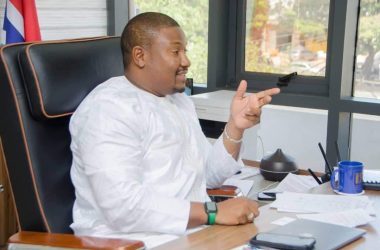
(JollofNews) -In a shrunken global community thanks to the Internet, word gets around pretty fast. As I arrived Demba Doo from Dabnani on Sunday evening, a clearly agitated friend called to say I must respond to a critique against my contention that the National Assembly’s (NA) purported amendment of section 62(1)(b) of the 1997 Constitution of the Republic of The Gambia (the Constitution) was an unlawful special measure that, for now, cannot positively assist the vice presidential quest of Aja Fatoumata Jallow-Tambajang.
To my protestation I had urgent matters to conclude, and that this can wait, he insisted on an immediate response on the grounds that silence, or delay, or failure to reply could be interpreted negatively. NAWEC plunged my part of Sukuta into darkness until about midnight by which time I was drifting into sleep and in no mental shape to join battle with the combative former Managing Director of the Observer Media Company, illustrious propagandist with some level of access to the rarefied inner core of public power in the former dispensation.
The cause of my friend’s angst was none other than Gambia’s Luntango Suun Gann Gi, real name Dida Halake, distinguished man of letters, and teacher of English to the native English. His aura as a communication specialist notwithstanding, Halake spectacularly lost his bearings in the labyrinth of the Constitution.
I reemphasise my thesis that notwithstanding the erroneous Executive conduct in shepherding a purported amending Bill, and the incomprehensible Legislative temerity in voting for it, section 62(1)(b) of the Constitution was not amended.
Now for the chapter and verse of the pertinent law in the precise words of the Constitution:-
“CHAPTER XXII – Amendment of the Constitution
226:- Alteration of this Constitution
(1) Subject to the provisions of this section, an Act of the National Assembly may alter this Constitution.
(2), “Subject to subsection (4), a Bill for an Act of the National Assembly under this section shall not be passed by the National Assembly or presented to the President for assent unless:-
(a) before the first reading of the Bill in the National Assembly, the Bill is published in at least two issues of the Gazette, the latest publication being not less than three months after the first, and the Bill is introduced into the National Assembly not earlier than ten days after the latest publication, and
(b) the Bill is supported on the second and third readings by the votes of not less than three-quarters of all the members of the National Assembly”.
From the above, there is no issue whatsoever that the architecture of Constitutional amendment/alteration is exclusively sourced in section 226 (see subsection 1).
Any attempt to amend the Constitution outside section 226 denotes a conclusively futile journey. Section 226(1) may be referred to as the exclusivity provision on amending/altering the Constitution.
It is noteworthy that the Constitution has general and entrenched provisions with the amendment procedures for the latter more onerous and involved, a primary reason no one ever tinkered with the ‘obnoxious’ – from a totalitarian perspective – fundamental rights and freedoms enshrined in Chapter IV.
Section 226(2) deals with amending the general provisions of the Constitution and a minimum of one hundred days is required for the lawful amendment of any section of the document, an implicit reminder of the apt saying that power corrupts and absolute power corrupts absolutely. In other words, the ambit of public power must be constrained in a manner that defangs transient majorities and restrains a wholesale abuse of the public trust by baseless amendments to the supreme law of the land.
Driving home this point, section 226(4), dealing with the amending procedure for the exceptional democratic values, is grounded in concrete and supported with multiple layers of protection. Subsection 4 states that “A Bill for an Act of the National Assembly altering any of the provisions referred to in subsection (7) shall not be passed by the National Assembly or presented to the President for assent unless:-
(a) the Bill is published and introduced in the manner required by paragraph (a) of subsection (2);
(b) the Bill is supported on the second and third readings by the votes of not less than three-quarters of all the members of the National Assembly;
(c) the Bill has been referred by the Speaker to the Independent Electoral Commission and the Commission has, within six months of such reference, held a referendum on the Bill; and
(d) at least fifty per cent of the persons entitled to vote in the referendum have taken part in the referendum and the Bill is supported in the referendum by at least seventy five per cent of those who voted”.
The foregoing subsection delineates the amendment procedure for entrenched provisions, those sections of the Constitution ring fenced and accorded additional safeguards against excess by transient majorities. No amendment of an entrenched provision (see 226(7) for the full list) is permissible without the direct input of the people via a mandatory referendum.
In his final pitch to the jury, Luntango contended that “THE AGE AMENDMENT IS NOT IN THE “PROVISION” IN SUBSECTION (7) – and therefore DOES NOT require the 3-months Gazetting!” This is an utter misperception of the law! It is not under 226(7) because 62(1)(b) is not an entrenched provision and comes under the general amending procedure outlined in 226(2).
Luntango’s clients must get their money back for presenting so hopeless a defence to the jury. I recommend that they negotiate future briefs on constitutional questions with his Chambers on a “no win no fee” basis.
Over to the jury!
By Lamin J. Darboe





Lol, I love it Lamin!
But the fact remains as you state: “226:- Alteration of this Constitution
(1) Subject to the provisions of this section, an Act of the National Assembly may alter this Constitution.” SUBJECT TO DA PROVISIONS BRAV!
And 226 subsection (7) provisions do not include “age” as an entrenched clause … SO, I SUBMIT TO THE JURY, WE CAN CHANGE the “age” stipulations in the Constitution outside 226 because 226 allows us to do so. But you can’t be judge and jury Brav, so we have to leave the dispute to be settled by the Right Hounourable Chief Justice Hassan B Jallow. I appreciate you have taken it easy on me, but that could be because of NAWEK – lol! You must move to upmarket Kotu – they don’t normally cut electricity to that part (LOL).
PS: As Observer MD, the first person I fired was the “retained Lawyer” whose name I forget. I appeared at the High Court in my white Kaftan and stood next to Lawyer “Mandela” Darboe (who I must admit surveyed me rather dubiously!). But I had the last laugh when the Honourable Judge gave me what I sought – a “Sine Die” so that I don’t half to retain the lawyer and pay him every month (the case was going nowhere because the Speaker being sued had immunity!). Next day’s Doctor Owl asked: “Is Sine Die the same as Half Die?”.
Enjoy Gambia. I envy you but can’t travel for exactly three years – when I hope the daughter will murder some GCSE’s with top grades.
PS: lamin, you says: “under the general amending procedure outlined in 226(2).”
“226(2)” is also subject to 226(7) and so 226(2) is also a “nullity” (lol!) as far as changing the “age” provisions is concerned! Infact, the whole of 226 does not allow amendment of the “age” provision in the Constitution!
Lamin, I may be a GAINAKO (proudly so!) but I have “eaten” a Barrister and his Solicitor alive in the High Court at the Strand … and walked away with the case and costs!
Mr Darbo can you please explain to me a layman what is meant by “subject to (4) as written in the constitution. This question is for anyone who is a legal expert?
Very good question. This “subject to” is the source of the confusion for laymen. Nonetheless, the Hon. Lamin J. Darbo’s answer that the law wasn’t adhered to is sufficient for me.
The Hon. Justice Minister also concurred with that opinion, and has taken full responsibility, as the chief legal adviser of government.
My in law has lost this case.
What a long and winded way of saying: shame on us, for we don’t even have the expertise to give proper and accurate [legal] advice when asked!
Back to the drawing board then, and whilst we are at it, lets reflect on our lack of a skilled workforce and how to remedy that. Currently it would appear that there is no shortage of university graduates floating around, but have the got the right level of knowledge and understanding, and most importantly experience to deliver seamless advice to the government when needed? This will be crucial as we continue along the road of building a modern states.
Hats off to Lamin J Darbo – my clients have thrown the towel in! So I have lost the case and Lamin has won (but I still win the argument!).